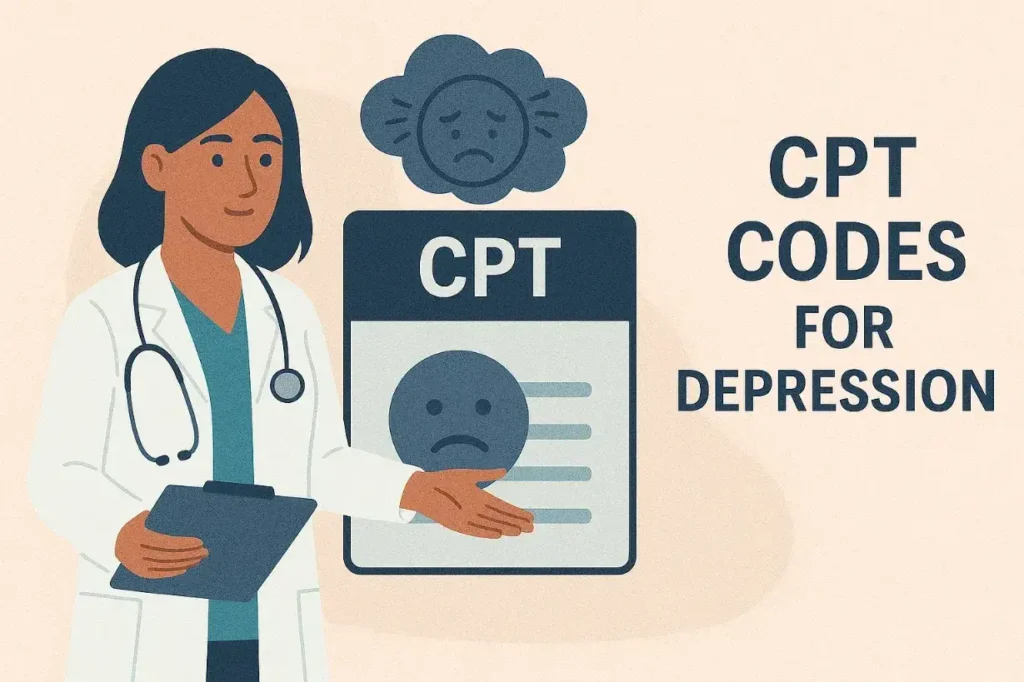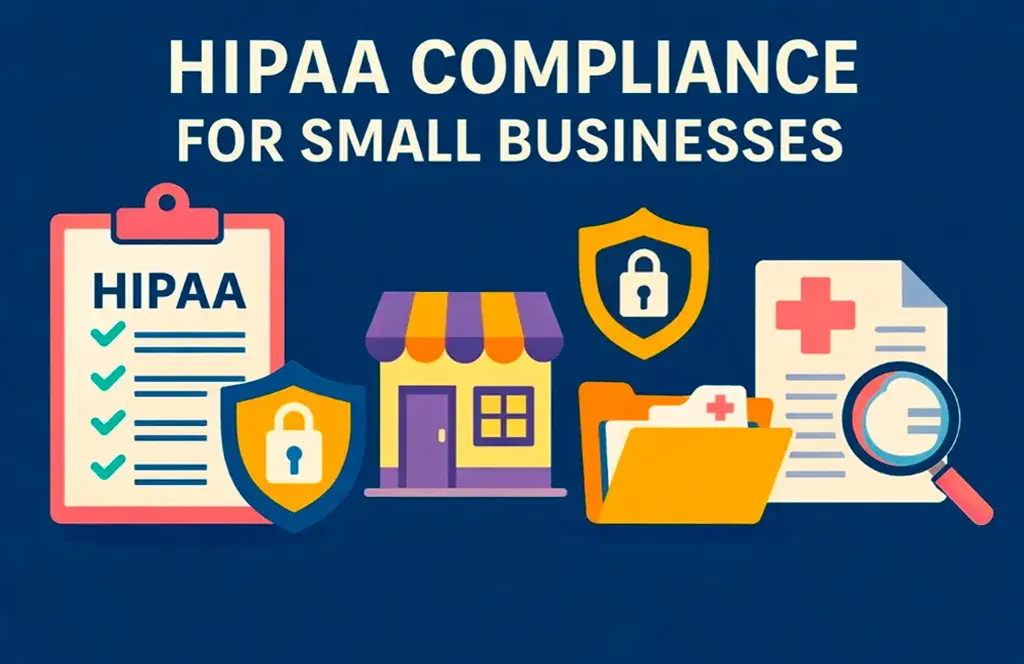Table of Contents
ToggleUnderstanding Diagnostic Codes for Depression in Mental Health Services
Accurate depression billing is a critical part of providing high-quality, compliant care in the mental health field. Providers must handle documentation, regulatory requirements, payer rules, and code selection with precision. Mastery of diagnostic coding and procedural reporting helps ensure accurate billing and timely reimbursement.
Mental health billing begins with selecting the right ICD-10-CM code. These codes—part of the International Classification of Diseases, 10th Edition (ICD-10-CM) maintained by the World Health Organization—are used to represent specific mental health conditions, including different episodes of depression, anxiety, and mood disorders. Accurate coding ensures regulatory compliance and reflects the complexity of each case.
Commonly Used ICD-10 Codes for Depression
When treating depression, the choice of code depends on the patient’s diagnosis, the severity of symptoms, and whether the episode is single or recurrent. These specific codes help define the level of service provided.
Common ICD-10 codes for depression include:
-
F32.0 – Major depressive disorder, single episode, mild
-
F32.1 – Major depressive disorder, single episode, moderate
-
F32.2 – Major depressive disorder, single episode, severe, without psychotic features
-
F32.3 – Major depressive disorder, single episode, severe, with psychotic features
-
F32.9 – Major depressive disorder, single episode, unspecified
-
F33.0–F33.3 – Recurrent depressive disorder (mild to severe)
-
F34.1 – Dysthymic disorder
-
F41.9 – Anxiety disorder, unspecified
-
F06.32 – Mood disorder due to a known physiological condition
Selecting the right code is essential to ensure proper reimbursement and avoid claim denials. Providers should thoroughly document the patient’s diagnosis, clinical history, and symptom presentation to support the selected diagnosis. The use of ICD-10 billing guidelines from CMS is recommended to stay compliant with Medicare and other payer expectations.
CPT Codes and Current Procedural Terminology for Depression Services
In addition to diagnosis codes, accurate CPT coding—known as Current Procedural Terminology (CPT) and maintained by the American Medical Association—is necessary to describe the procedures and services provided. Mental health providers must select the correct psychotherapy codes to represent therapy sessions, evaluations, and consultations.
Proper billing relies on matching the right CPT code to the services rendered, including session duration, treatment complexity, and service type.
CPT Codes Frequently Used in Depression Billing
-
90832 – Psychotherapy, 30 minutes
-
90834 – Psychotherapy, 45 minutes
-
90837 – Psychotherapy, 60 minutes
-
99202–99205 – New patient evaluation and management
-
99211–99215 – Established patient visits
-
99213 – Office visit (typical for mild to moderate cases)
-
90863 – Medication management with psychotherapy
-
90846, 90847 – Individual and family psychotherapy
Each code is used to reflect a distinct procedure, and accuracy is crucial. Combining E/M and psychotherapy services in one visit is allowed when documented properly. Providers must use Modifier 25 to separate the services clearly.
Documentation Requirements and Clinical Billing Guidelines
To support billing and demonstrate medical necessity, documentation must be clear, complete, and compliant with regulatory standards. Providers should ensure accurate documentation for each visit.
Clinical documentation plays a key role in demonstrating the need for treatment, particularly for depression-related services. The APA clinical guidelines for depression emphasize the importance of progress tracking, accurate symptom reporting, and alignment between diagnosis and treatment plans.
Key Components of Accurate Documentation
-
Documentation of the patient’s symptoms and functional limitations
-
Results from clinical assessments such as PHQ-9
-
A comprehensive evaluation and treatment plan
-
Notation of time spent during therapy sessions or medication consultations
-
Response to medication, behavioral observations, and goals for follow-up
-
Updates that reflect when there is a need for additional care
Accurate documentation improves communication, supports continuity of care, and helps secure reimbursement from payers.
Insurance Verification and Reimbursement Considerations
Providers must verify the patient’s insurance coverage before starting treatment. Each payer—whether Medicare, Medicaid, or private insurers—has its own billing rules, including covered services and code restrictions.
Reimbursement rates are influenced by code selection, service setting (e.g., in-office or telehealth), and insurer type. Coding and billing procedures must align with payer requirements to ensure smooth processing.
Reimbursement and Payer Differences
-
Telehealth coverage and session limits vary widely
-
Some private insurers require prior authorizations
-
CPT and ICD-10 code combinations must meet specificity standards
-
Claims lacking accurate coding are often rejected or underpaid
By addressing these variables in advance, providers can better reimburse for services and avoid payment delays.
Telehealth Depression Services and Accurate Coding
Telehealth is a growing component of modern mental health care. Providers must ensure that remote services are billed correctly using appropriate CPT modifiers, accurate documentation, and consistent reporting practices.
Telehealth services for depression include medication management, psychotherapy sessions, and consultations—all of which require coding precision. For guidance, refer to telehealth billing and reimbursement standards published by HHS.
Best Practices for Telehealth Billing
-
Use Modifier 95 to indicate real-time audio/video delivery
-
Apply correct place-of-service codes (02 or 10)
-
Confirm payer-specific telehealth reimbursement policies
-
Accurately document the services rendered, including time, procedure, and patient consent
Accurate billing for telehealth depends on clear documentation, appropriate code selection, and alignment with payer rules.
How to Avoid Claim Denials in Mental Health Billing
Claim denials can result from inconsistent documentation, outdated code sets, or mismatch between clinical notes and codes. Following structured billing guidelines and conducting regular internal audits help mitigate these risks.
Mental health billing requires continuous staff education, payer research, and attention to clinical specificity.
Strategies to Improve Billing Outcomes
-
Ensure accurate coding using up-to-date CPT and ICD-10-CM standards
-
Match the complexity of the procedure with the documented level of care
-
Confirm insurance benefits and authorization requirements before care
-
Conduct regular billing reviews to spot and correct common issues
-
Document progress clearly at every stage of care
These practices contribute to accurate billing, reduce the likelihood of denials, and maintain regulatory compliance.
Why Proper Billing for Depression Services Matters
Proper billing ensures that providers receive fair compensation while patients continue to get uninterrupted care. When done correctly, billing reflects the full scope of services delivered and helps justify the cost of ongoing mental health treatment.
Depression services, including therapy sessions, medication management, and consultations, must be billed using specific codes with appropriate documentation. Accurate coding reflects the provider’s professional expertise and supports long-term clinical outcomes.
As highlighted by the SAMHSA overview on mental health services, accurate billing and documentation practices are essential for ensuring access to care and sustainable clinical operations.
Get Expert Help with Depression Billing from Swift Medical Billing
If managing coding, documentation, and payer requirements is taking time away from your patients, it’s time to partner with Swift Medical Billing.
At Swift Medical Billing, we help mental health providers:
-
Ensure accurate coding and proper billing
-
Reimburse correctly for services rendered
-
Navigate regulatory and payer-specific rules
-
Improve revenue cycles with fewer denials and delays
-
Focus more on patient care and less on paperwork
Let our experts handle the complexity of billing—so you can focus on what you do best: treating patients.
Contact us now for a free consultation and learn how Swift Medical Billing can support your practice.




